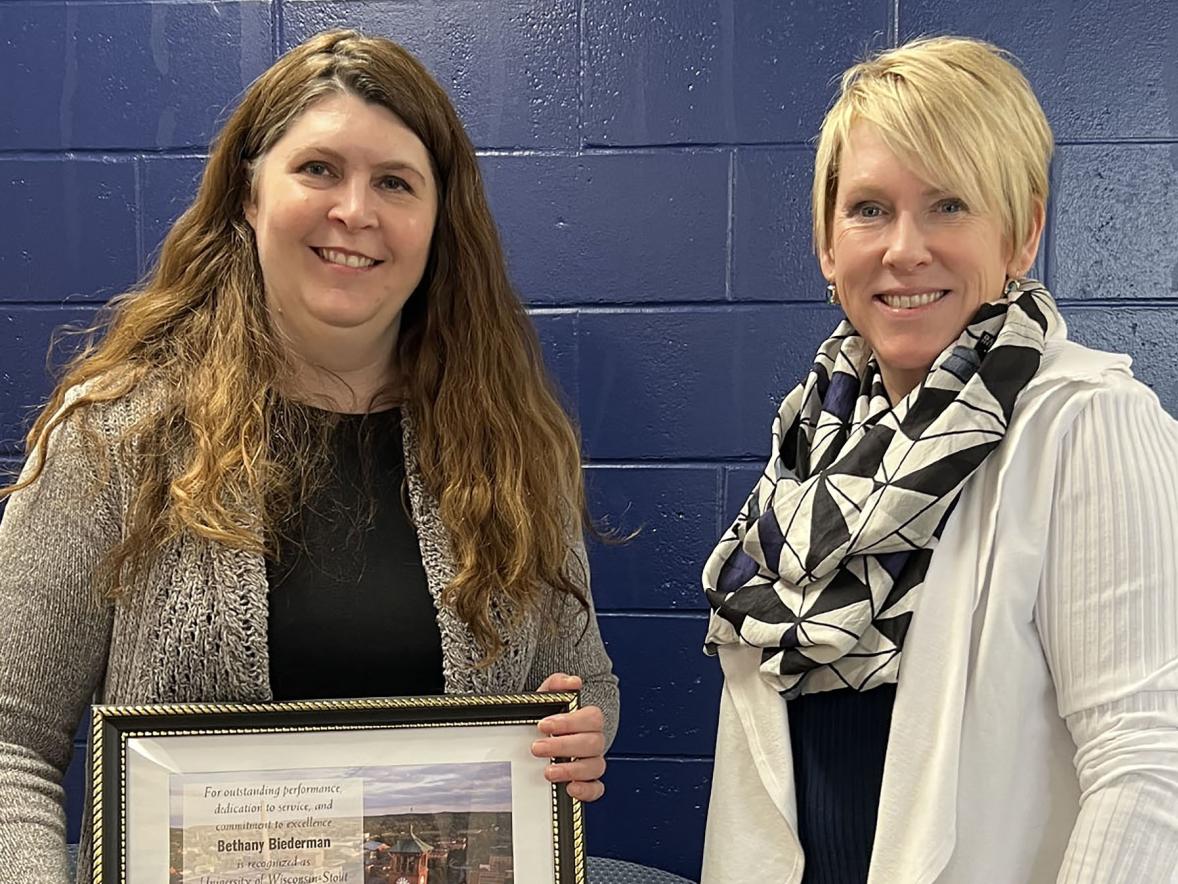Service. Research. Education.
The Stout Vocational Rehabilitation Institute (SVRI) serves as a leader to advance innovative programs and practices in disability and employment through services, research, and education programs preparing vocational rehabilitation professionals to empower people with disabilities to maximize careers and independence.
SVRI contributes to the mission of the University of Wisconsin-Stout by providing solutions to positively impact the future of persons with disabilities and others in the community through services, research and education.
SVRI NEWS...
Mission: SVRI contributes to the mission of the University of Wisconsin-Stout by providing services, research, and education programs preparing vocational rehabilitation professionals to empower people with disabilities to maximize careers and independence.
Vision: SVRI aspires to be the preeminent national source of expertise, services, research, and professional education programs that advance the art and science of vocational rehabilitation.
Values: SVRI is committed to the University of Wisconsin-Stout mission, vision, values, and student success. SVRI is committed to empowering people with disabilities to maximize career development, independence, and community inclusion. They are dedicated to the advancement of the vocational rehabilitation profession by providing innovative services, life-long professional career education, and academic research that contributes to the profession's knowledge base. SVRI's actions are guided by core principles of trust and integrity; inclusion; valuing diversity; and treating others with respect and kindness.
Stout Vocational Rehabilitation Institute (SVRI) is a national leader within the vocational rehabilitation (VR) field, promoting services, education, and research for the benefit of students, persons with disabilities, and VR professionals. As part of the University of Wisconsin-Stout (UW-Stout), a public, nonprofit educational institution located in Menomonie, Wisconsin, it is tax exempt under Internal Revenue Service Section 170(c)1. As Wisconsin’s Polytechnic, UW-Stout is recognized for its applied learning, career focus, and collaborative partnerships and is the first university to receive the Malcolm-Baldrige National Quality Award for performance excellence. SVRI formed in 1966 through Department of Health, Education, and Welfare grants, led by Dr. Paul Hoffman, to create a graduate-level professional VR training program—the first in the world at that level—and an undergraduate VR program—one of 10 in the nation and the only one built on a vocational rather than psychosocial model at the time. In subsequent decades, SVRI expanded its scope to address the evolving needs of the field and VR consumers, as evidenced by its accomplishments and continued innovations.
SERVICES
Soon after its launch in the 1960s, SVRI established a center to provide direct services to people with disabilities and to serve as a clinical training site for UW-Stout students. From the first cohorts until today, over 1,400 graduate students and around 2,500 undergraduates have entered the VR field, benefiting both from UW-Stout’s programs as well as applied learning at SVRI. For instance, in the past five fiscal years, 20 students held paid positions, 11 completed practicums, and 6 interned at SVRI. In the 1980s, SVRI added independent living, rehabilitation technology, and collaborative projects with industry to its service portfolio. By the 2000s, SVRI expanded to sensory (deaf/blind) services, benefits analysis, and vocational evaluation. In the 2010s, SVRI stepped into a key role in the federal-state VR program, which equips over 1 million Americans per year with skills to obtain high-quality competitive employment and community integration. SVRI piloted and still implements a centralized administrative process for the program, determining eligibility and processing applications for Wisconsin’s Division of Vocational Rehabilitation (DVR). In its latest service expansion, SVRI announced in 2021 that it would provide work-based learning and career exploration to young adults with intellectual and developmental disabilities with Project SEARCH. The impact of SVRI’s nationally accredited staff, who actively design and provide services and offer critical referrals and employer connections, is clear: in the past five fiscal years, SVRI served nearly 48,000 residents of Wisconsin, where almost 1 million adults live with a disability and are employed at a rate half that of those without a disability (41% vs. 85%). Specifically, 46,880 worked with the Eligibility and Order of Selection unit for the DVR program, 465 received Work Incentive Benefits Counseling, 420 accessed Assistive Technology, and 181 completed Vocational Evaluation, in addition to Self-Employment and Business Services support.
EDUCATION
SVRI began offering in-person continuing professional education, career advancement, and specialized education services in the late 1960s and online training in the 2000s. It is able to achieve nationwide impact with its training and technical assistance for rehabilitation professionals and state VR agencies by providing direct consulting and training while playing key roles in grant-funded technical assistance centers, such as the Administration for Community Living Rehabilitation and Research Training Center, Program Evaluation and Quality Assurance Technical Assistance Center, Quality Employment Technical Assistance Center, and Targeted Communities Technical Assistance Center. SVRI also delivers exam preparation for those VR professionals who wish to become Certified Rehabilitation Counselors through the national Commission on Rehabilitation Counselor Certification (CRCC). As a progression of this offering, SVRI launched the National Training Center for Transformational Leadership in 2021, in partnership with UMass-Boston and CRCC, for those who wish to become Certified Rehabilitation Leaders. All education is informed by the SVRI Continuing Professional Education Advisory Council, which comprises small and large VR agencies in rural and urban states that represent diverse agency types. Over the past five fiscal years, over 28,000 VR professionals from all 50 states have participated in SVRI training events, including staff of state VR agencies, community-based organizations, workforce agencies, community rehabilitation programs, as well as K-12 and post-secondary institutions.
RESEARCH
SVRI has served as a resource for and conductor of innovative VR research since its founding. In the late 1960s, SVRI created a center for print publications, which it ran through the 1980s and the onset of online materials in the 1990s, and put out a bulletin that reached thousands of VR professionals across and outside the U.S. SVRI has also sought to publish in peer-reviewed journals and join collaborative grant projects, notably with the Council of State Administrators in VR; Educate, Empower, Employ within Targeted Communities; Include, Respect, I Self-Direct; National Institute on Disability, Independent Living and Rehabilitation Research; Rehabilitation Research and Training Center for Evidence Based Practice in VR; Social Security Administration; Telecommunications Equipment Purchase Program; Veterans' Administration; Western Region Recovery and Wellness Consortium; and Wisconsin Board for Persons with Developmental Disabilities, Department of Health Services, and Promoting the Readiness of Minors in Supplemental Security Income. In the past five fiscal years, SVRI carefully managed $17 million in grant monies. And SVRI continues to push for research and resource-sharing, debuting the Innovation Inspiration Expo in 2022, an annual event to highlight innovative field-initiated practices.
Kyle Walker became SVRI’s fifth Executive Director in 2019, leading the four functional units (Services, Research, Education, and Operations) and managing the $5 million annual budget, which is primarily funded through grants and services. The 30+ member team is focused on operationalizing the Chancellor-approved 2022–2026 Strategic Plan by enhancing the three core competencies and focusing on mission and vision: respectively, To contribute to the mission of UW-Stout by providing services, research, and education programs preparing VR professionals to empower persons with disabilities to maximize careers and independence AND To be the preeminent national source of expertise, services, research, and professional education programs that advance the art and science of VR.






